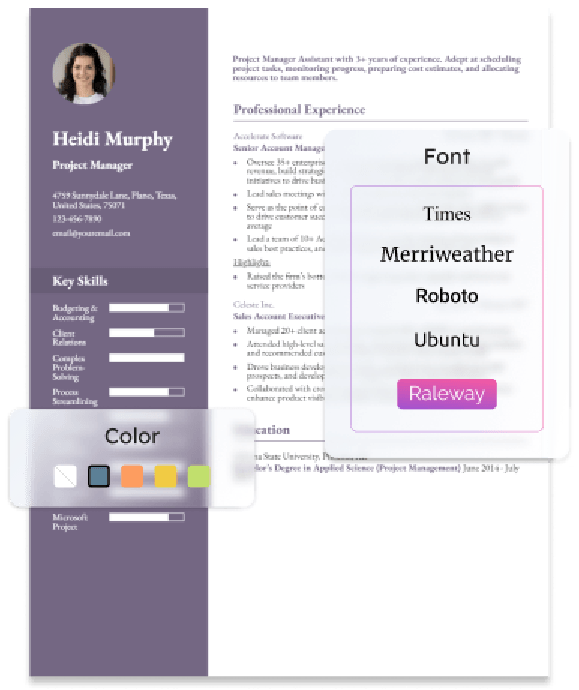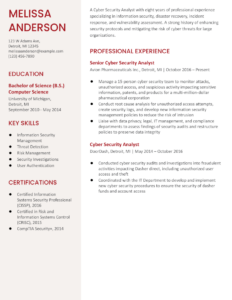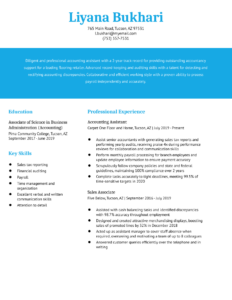How To Write a Military-To-Civilian Resume
Transitioning from a military career to a new industry as a civilian can be challenging for many veterans. Reframing your military accomplishments to align with jobs on the open market is often difficult. You’ll want to create an accomplishment-driven resume that leverages your leadership experience and technical skills to propel your job search forward during this career transition.
Rather than overwhelming the reader with complex military terminology, you’ll want to present your achievements in a way that hiring managers can easily understand. Throughout our military resume builder guide, we’ll provide expert tips to help you translate your military experience into a strong, professional resume.
- Entry-Level
- Mid-Career
- Senior-Level
1. Create a profile by summarizing your military-to-civilian qualifications
Your professional profile should open with your title, years of experience, and three to four specializations to align with the position you’re applying for. This is especially important for military-to-civilian resumes, as you must show hiring managers you have key qualifications the organization is looking for in place of industry experience.
Example 1 - Military Resume Professional Profile
Profile
A Network Security Analyst with over eight years of experience identifying threats and identifying innovative solutions. A proven track record of mitigating cybersecurity threats and providing technical support to military personnel and civilians.
Example 2 - Military Resume Professional Profile
Profile
A Supply Chain Coordinator with 10+ years of military experience, specializing in logistics, fleet management, and procurement. A strong history of overseeing multi-million-dollar supply chains to support military operations.
2. Add a compelling section featuring your military-to-civilian experience
To grab the hiring manager’s attention, you want to create compelling bullet points that showcase your strongest and most relevant accomplishments. It’s important to remember that most readers will be unfamiliar with military terminology, so you’ll need to translate your experience into language that the hiring manager can understand.
You should also quantify your career achievements using hard numbers and metrics. For instance, if you provide logistical support for a military supply chain, you should include a monetary figure to establish a sense of scope. It’s also important to keep your audience in mind when deciding what information to include. For example, mentioning that you were supporting a $38M supply chain may grab the interest of a medium-sized or large organization but could be intimidating if you’re applying to a smaller company.
Example 1 - Military Resume Professional Experience Section
Professional Experience
Cyber Security Officer, Fort Gordon, Augusta, GA
October 2017 – Present
- Triage phones, password resets, and VPN and internet connectivity, identify cyber security threats, and oversee access management to ensure data integrity
- Configure, install, and maintain edge routers, firewalls, laptops, and LAN switches
- Manage a team of 25 civilian and military employees and coordinate the delivery of tactical and technical support to subordinates and superior officers
Example 2 - Military Resume Professional Experience Section
Senior Logistics Officer, Fort Bragg, Fayetteville, NC
September 2016 – October 2017
- Coordinated logistics for multi-million-dollar supply chains supporting domestic and international operations for the Marine Corps, Air Force, and Coast Guard
- Oversaw the procurement, transport, and distribution of supplies to troops for military operations, including food, medical supplies, ammunition, and fuel
- Led a team of 10+ army personnel to manage inventory and logistics, assigned responsibilities, evaluated performance, and ensured adherence to army standards
3. Add military-to-civilian education and certifications
Acquiring industry certifications can be a powerful asset during your career change. Many of your skill sets and accomplishments from your time in the military are readily translatable to civilian jobs, but obtaining additional certifications goes a step further in bridging the gap. For instance, even if you have extensive experience in security from your military career, you may want to consider pursuing a cybersecurity or network security certification. This strategy can help bolster your odds of landing the interview.
Certifications
Template
- [Certification Name], [Awarding Organization], [Completion Year]
Example
- Certified Information Systems Security Professional (CISSP), Coursera, 2017
- CCNA Security, Cisco, 2016
- CompTIA Security+, CompTIA, 2015
Education
Template
- [Degree Name]
- [School Name], [City, State Abbreviation] [Dates Enrolled]
Example
- Bachelor of Science (B.S.) Computer Science
- WIDENER UNIVERSITY, Chester, PA September 2019 – May 2023
4. Include a list of skills and proficiencies related to military-to-civilian experience
It’s important to feature a variety of skills and keywords that match the job description as you craft your military resume. One of the most prominent challenges veterans face during the job search is showing hiring managers that their army experience is translatable to their target industry. Incorporating a strong mix of keywords throughout your resume will ensure compliance with applicant tracking systems (ATS) and show prospective employers that you’re a qualified candidate.
| Key Skills and Proficiencies | |
|---|---|
| Administration | Analytics |
| Communication | Continuous Improvement |
| Crisis Response | Cross-Functional Leadership |
| Cybersecurity | Database Administration |
| Information Technology (IT) | Logistics |
| Network Security | Operations Management |
| Process Improvement | Project Management |
| Risk Mitigation | Supply Chain Management |
| Technical Support | Team Management |
| Vulnerability Assessment | |
5. Additional military resume builder tips
Before writing your military resume, you’ll want to take some time to identify your target industry. This part is one of the more challenging aspects of the career change process. As you review your military experience and accomplishments, think about how these might translate to a civilian career. Are your skill sets more of a technical nature? Are you better suited for an operations management role? Analyzing job postings before crafting your resume will help you to identify the relevant aspects of your experience and translate them into effective bullet points for the hiring manager. Read our Veteran’s Resume and Job Hunting Guide for more military resume-builder tips.
How to Pick the Best Military-to-Civilian Resume Template
When selecting your military-to-civilian resume template, choose a straightforward and well-organized format. A limited amount of color is acceptable, but it’s better to avoid flashy graphics that may distract the reader. The top-down approach is also recommended in most instances since arranging your sections in a manner that splits the page may make reading difficult. Remember, hiring managers are focused on learning more about your qualifications and professional achievements, so you’ll want your template to support that objective rather than draw attention elsewhere.
Military-to-Civilian Text-Only Resume Templates and Examples
- Example #1
- Example #2
- Example #3
Raymond Ortiz
(123) 456-7890
[email protected]
LinkedIn | Portfolio
123 Abbington Lane, Athens, GA 12345
Profile
A Network Security Analyst with over eight years of experience identifying threats and identifying innovative solutions. A proven track record of mitigating cybersecurity threats and providing technical support to military personnel and civilians.
Professional Experience
Cyber Security Officer, United States Army, Fort Gordon, GA
October 2017 – Present
- Triage phones, password resets, and VPN and internet connectivity, identify cyber security threats, and oversee access management to ensure data integrity
- Configure, install, and maintain edge routers, firewalls, laptops, and LAN switches
- Manage a team of 25 civilian and military employees and coordinate the delivery of tactical and technical support to subordinates and superior officers
Information Technology Specialist, United States Army, Fort Gordon, GA
September 2015 – October 2017
- Installed, operated, and maintained computer systems and local area networks
- Troubleshot computer systems and hardware to support military operations, which included debugging and testing new software
- Provided technical support to military personnel for a wide range of IT-related issues
Key Skills
- System Administration
- Information Technology
- LAN and WAN
- Network Administration
- Cyber Security
Certifications
- Certified Information Systems Security Professional (CISSP), Coursera, 2017
- CCNA Security, Cisco, 2016
- CompTIA Security+, CompTIA, 2015
Education
Bachelor of Science (B.S.) Computer Science
University of Georgia, Athens, GA September 2011 – June 2015
Frequently Asked Questions: Military-to-Civilian Resume Examples and Advice
What are common action verbs for military resumes?-
It’s easy to find yourself running short on action verbs as you build your military resume. In many instances, you can use only a limited number of verbs to convey your professional achievements accurately. Differentiating your usage of action verbs can enhance the reading experience of your document. To help you out, we’ve compiled a list of verbs you can use to keep your content fresh and compelling:
| Action Verbs | |
|---|---|
| Administered | Analyzed |
| Coordinated | Conducted |
| Created | Diagnosed |
| Delivered | Developed |
| Evaluated | Executed |
| Identified | Improved |
| Led | Managed |
| Oversaw | Performed |
| Provided | Supervised |
| Supported | |
How do you align your military resume with a job description?-
Although many challenges are associated with transitioning from a military career to civilian employment, your experience as a veteran also has several unique advantages. According to the Bureau of Labor Statistics, the average employment rate of all veterans was 2.8 in 2022, which was lower than the 3.6 rate for non-veterans.
To effectively market your military experience for civilian jobs, you’ll need to align your resume with the job description carefully. As you craft your bullet points, you want to focus on reframing your military achievements to show why you’re uniquely qualified. This means limiting your usage of complex military terminology and instead highlighting aspects of your army experience that are explicitly relevant to the job you’re pursuing.
What is the best military resume format?-
You’ll often want to use a reverse chronological format for military resumes. This format will feature your most relevant experience at the top of your resume. However, if you feel that your military achievements are readily translatable to the industry you’re pursuing, you may consider placing your education, skills, and certifications towards the top. For instance, if you completed a computer science degree but weren’t employed as an IT officer, it may be beneficial to place relevant technical skills and certifications higher up on the document.
Craft your perfect resume in minutes
Get 2x more interviews with Resume Builder. Access Pro Plan features for a limited time!

Providing a cover letter can bolster the strength of your application during the military-to-civilian transition. The cover letter offers another opportunity to showcase how your military experience is relevant to your target industry. When building your cover letter, you should mention something about the organization’s reputation or work culture in the middle paragraphs of the document. This strategy will show hiring managers that you’ve researched before applying, which reflects positively on you as a candidate. For more insights, read our military-to-civilian cover letter guide.






